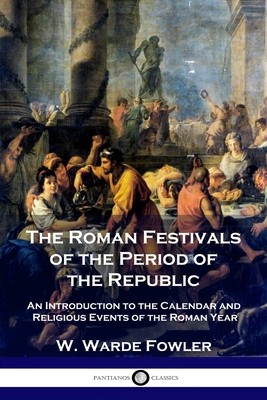
- We will send in 10–14 business days.
- Author: W Warde Fowler
- Publisher: Pantianos Classics
- ISBN-10: 1789872359
- ISBN-13: 9781789872354
- Format: 15.2 x 22.9 x 1.6 cm, softcover
- Language: English
- SAVE -10% with code: EXTRA
Reviews
Description
Ancient Rome is renowned for its distinctive calendar and frequent festivals dedicated to various Gods; classical scholar W. Warde Fowler discusses each event, and its role in Roman religious and cultural life.
The modern, twelve-month calendar was built upon the foundations set by the Romans. Several of the months retain the names invented in Roman antiquity, and the meaning of several months in the context of seasonal weather and yearly holidays remain. While timekeeping has evolved to better suit the revolutions of the Earth, the framework established by the ancient Romans remains. Appended at the conclusion of the preface are charts of Rome's calendar, showing the individual days and events.
Taking us through the Roman year, Fowler demonstrates how ancient Rome placed great significance upon their Gods. Festivals were of enormous importance in community life; gatherings and celebrations enforced the beliefs in the Roman Gods and cemented aspects of its traditions and culture. How traces of these ancient traditions endured through later periods of history is discussed. Additionally, the author mentions how in times of crisis Rome's festivals would host a return to primitive rituals as the fearful citizenry sought to ward off misfortune and ill-omens through animal sacrifice and other archaic rites.
EXTRA 10 % discount with code: EXTRA
The promotion ends in 20d.22:07:09
The discount code is valid when purchasing from 10 €. Discounts do not stack.
- Author: W Warde Fowler
- Publisher: Pantianos Classics
- ISBN-10: 1789872359
- ISBN-13: 9781789872354
- Format: 15.2 x 22.9 x 1.6 cm, softcover
- Language: English English
Ancient Rome is renowned for its distinctive calendar and frequent festivals dedicated to various Gods; classical scholar W. Warde Fowler discusses each event, and its role in Roman religious and cultural life.
The modern, twelve-month calendar was built upon the foundations set by the Romans. Several of the months retain the names invented in Roman antiquity, and the meaning of several months in the context of seasonal weather and yearly holidays remain. While timekeeping has evolved to better suit the revolutions of the Earth, the framework established by the ancient Romans remains. Appended at the conclusion of the preface are charts of Rome's calendar, showing the individual days and events.
Taking us through the Roman year, Fowler demonstrates how ancient Rome placed great significance upon their Gods. Festivals were of enormous importance in community life; gatherings and celebrations enforced the beliefs in the Roman Gods and cemented aspects of its traditions and culture. How traces of these ancient traditions endured through later periods of history is discussed. Additionally, the author mentions how in times of crisis Rome's festivals would host a return to primitive rituals as the fearful citizenry sought to ward off misfortune and ill-omens through animal sacrifice and other archaic rites.


Reviews